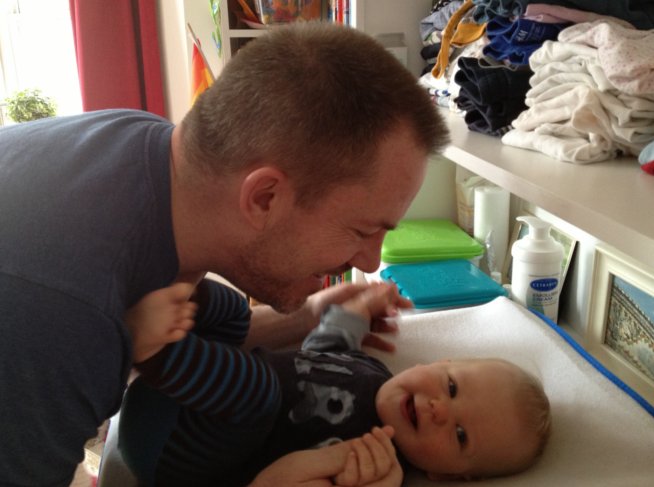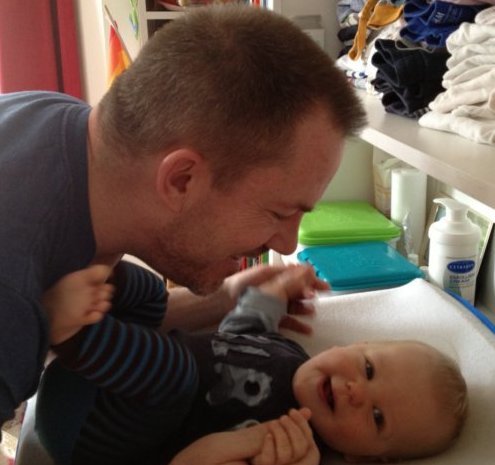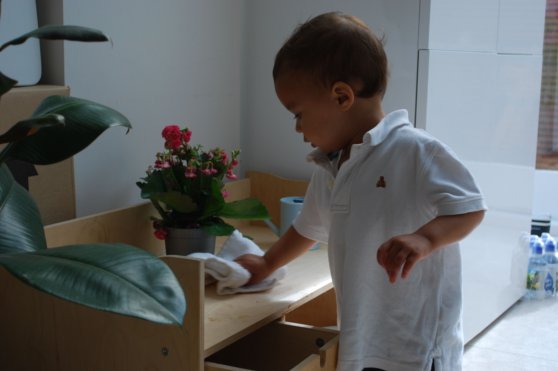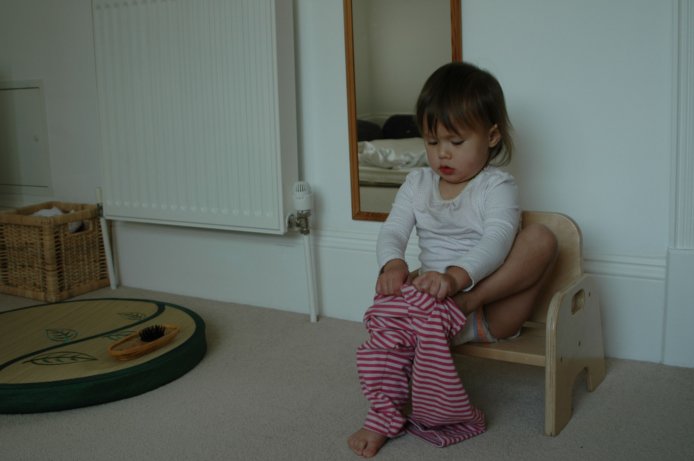Parents sometimes wonder what the most useful ‘Montessori’ thing they can do for their babies is. Now any parent who asks this question already knows about the fundamental importance of a gentle and loving relationship, the benefits of skin-to-skin contact for a newborn, the value of breastfeeding for nourishment as well as nurturing and so on. So I don’t talk about those things. I talk instead of two other things: presence and movement.
By presence I mean taking the time to be fully present with your baby when you are interacting with them. I love what Magda Gerber had to say about us being a generation that understands skin-to-skin contact but has forgotten soul-to-soul contact. Everyone knows what it feels like to be speaking with someone who is not present to that conversation. It feels empty, and we can feel unimportant to them.
Babies and children feel so nourished when we are completely present, even if only for a short period of time. A simple tip is to be completely present and take time during those many moments of ‘maternal care’ – feeding, changing and bathing. Rather than seeing these as tasks to do (and to get over with), try to see them as interactions to linger on. The value you give to each of these interactions is what builds within your baby the deep belief that “I am valuable and I am valued”.
And by movement I mean giving your baby a great deal of time on the floor, free to move. A yoga mat covered by a bed sheet works very well. I assure you: you do not need to spend money on baby gyms, bouncers, walkers, seats etc. All a young baby needs for their optimal development is a mat on the floor, and something for their hands to explore – a ring, a ribbon, a piece of paper. Babies especially benefit from having their legs and arms free of clothing so they can move with maximum freedom. Lets hope for a warm summer so you can give them this opportunity.
As they grow, their bodies change and so do their minds. Parents say they notice a particularly striking change in the mind of their child around the age of 14 or 15 months. They often say that this change happens over a matter of days, shortly after they become confident on their feet. Overnight they seem to change from babies to little children.
As they stand upright, these little ones seem to say “I am more like you now, dear Mummy and Daddy. Once I could only follow your actions from afar, and admire all that you could do. Now that I can stand by myself and my hands are free to work, I want to do all those things that you do each day. It is especially the ordinary that appeals to me, the routine practical tasks of our daily life”.
Thoughtful parents recognise that every toddler has a deep inner drive to participate in the practical little tasks of daily life. And they take steps to prepare an environment in which their child can collaborate with them in these tasks. In doing so, they adapt their home (once again!) so that it is both welcoming and functional for little people as well as big people.
Here are the kinds of things some parents say has worked for them.
“We cleared out a bottom cupboard in the kitchen and all Lila’s crockery and cutlery go there. I keep a couple of small yoghurt pots in the fridge, and she fixes herself a little yoghurt snack all by herself. She has a little bin beside the main kitchen bin, and she loves filling up her bin with banana peels and yoghurt pots.”
“Jennifer helped make a quiche yesterday. She sifted the flour, broke the eggs in the bowl, beat the eggs and the milk, and basically helped me at each step of the way. It took a whole afternoon, and we had the quiche for tea. It has to be one of the best afternoons we’ve spent together.”
“We took the sides off his cot and lowered it to the floor so Stanley can get in and out of bed by himself. His new independence has completely changed his bedtime routine. He goes to bed quite happily now whereas previously bedtime could be such a drama. Still wakes up at night though!”
“I have three photo frames from Ikea hung low above Felix’s bed. We have paintings and posters hung up on the wall – why not some at his height, just for him? I change the pictures I put in them from time to time – at the moment each is a picture of a fruit. He likes to point at the pictures and try to say their name”.
“One of Isabel’s favourite activities is emptying out the dishwasher. She handles the dishes with such care – my mother could hardly believe it when I told her! She loves loading it as well and (shh!) is way better organised than her dad.”
When your baby becomes a toddler, they become a new person, with new needs. Toddlers really do thrive in an environment in which they can make a contribution and not just be entertained. When a child has the routine experience of being treated like a valuable, contributing member of the family, they begin to see themselves as being valuable and as being able to contribute. It gives them a deep and abiding sense of confidence in themselves, a sense that life is good, and that they can add to its goodness.
Paul





